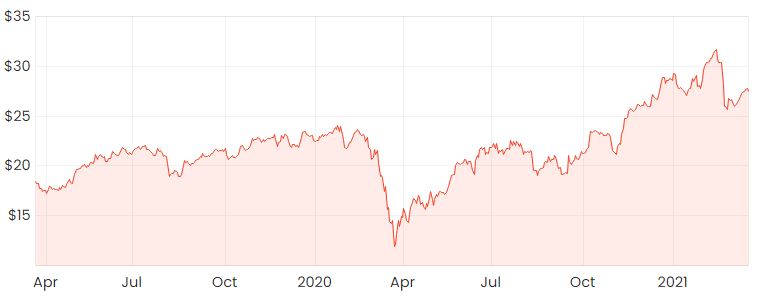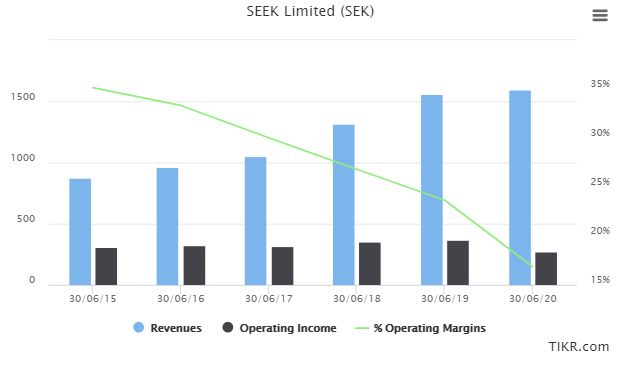Shares in job search platform SEEK Limited (ASX: SEK) are down by roughly 13% over the last month. Despite the recent pullback, shares have still delivered close to 100% since the bottom of the market in March last year. Is now a good time to buy in?
SEK share price

Why Seek’s shares have fallen recently
Seek is a growth company that has turned out to be a large beneficiary of COVID-19 and a low interest rate environment. The company had a fairly high proportion of debt relative to equity (1.3 D/E) as of FY20.
As we’re seeing bond yields rise significantly, the threat of rising interest rates would have a negative impact on the valuation of companies like Seek. Some other examples of growth companies that have trended downwards recently are Xero Limited (ASX: XRO), Afterpay Ltd (ASX: APT) and Altium Limited (ASX: ALU).
Recent financial performance
Seek’s most recent H1 FY21 results came in mostly in line with the market’s expectations, which you can read about here.
Group revenue was down 6% across H1 FY21 compared to the prior corresponding period (PCP), with most of the underperformance coming from its Asia and Latin America business segments which were down 27% and 42%, respectively.
Zhaopin, Seek’s Chinese business segment, reported a 10% drop in revenue on the PCP to $376.2 million.
In the half-year report, it was revealed that Seek was looking to potentially sell-down its ownership in Zhaopin. If the $2.2 billion transaction gets the green light, Seek would reduce its stake to around 23.5%.
Are Seek shares good value?
You may be wondering why the share price has doubled over the last 12 months if the company has seen a slowdown in performance due to COVID-19.
SEEK generates revenue through multiple streams, however, much of it is through ad revenue. As such, SEEK is very much leveraged to the overall economic cycle, which will influence the number of jobs that are listed on the website.
was most likely partly an overreaction in my view, as many workers transitioned to a work from home environment rather than being terminated. Seek has operations all over the world though, so pinpointing the exact drivers would be fairly complicated.
Seek has long been considered fairly expensive on traditional valuation metrics such as the Price/Earnings (P/E) multiple. While revenue growth has been significant over the last several years, the below image would indicate that it hasn’t been able to achieve significant margin expansion as of yet.
It’s understandable that the business has been reinvesting for international expansion, but it would be nice to see some evidence of how this translates to bottom-line growth in my view.

https://education.rask.com.au/2020/01/09/what-is-the-price-earnings-ratio-p-e/
Summary
Seek remains a hold for me at these levels. A lot of the growth in the global Seek business has mainly been driven by Zhaopin, so it will be interesting to see what happens if it does reduce its exposure by selling down its holding.
The management reshuffle doesn’t bother me too much with Commonwealth Bank of Australia (ASX: CBA) boss, Ian Narev taking over as the CEO, but I’m happy to wait on the sidelines to see how he transitions into the new role and directs the company from here.
While the stock itself has performed extremely well over the last 12 months, I’d want to see some more improvement in profitability before I’d be a buyer of Seek’s shares.
Before you consider Seek, I suggest getting a free Rask account and accessing our full stock reports. Click this link to join for free and access our analyst reports.










